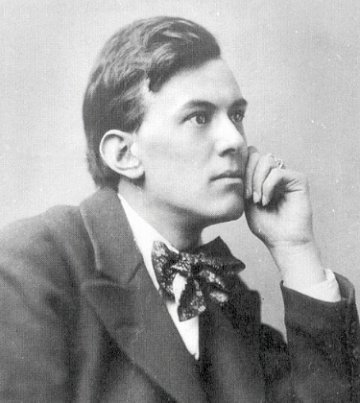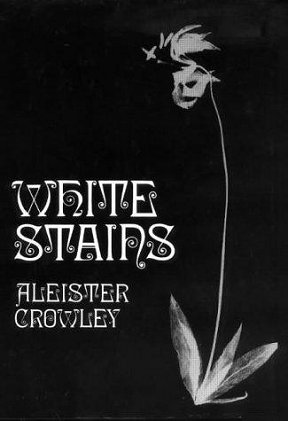

|
Part I: A Bookselling Trip to the Dark SidePrinter Friendly ArticleEDITOR'S NOTE: Today's feature article examines, in part, the life of a man who many consider to be the very incarnation of evil. Portions of this article are necessarily somewhat intense, so if you anticipate any potential for personal discomfort, it might be best to give it a miss. Thanks for your understanding. The most evil man in the world? There's no shortage of candidates. Bin Laden, Manson, Hitler, etc., but I'm sure that some "Outsiders" would vote in favor of somebody you may never have heard of, especially if you didn't grow up in the 1960's - and there's lots of evidence to back up the choice. Some clues. This man died at the age of 72 in 1947 shortly after cursing a doctor who refused to give him more heroin. Though he'd inherited his father's not insubstantial brewery fortune at 21, he was penniless. Though he'd once climbed some of the world's highest peaks, he had wasted away to a skeleton. It's been said that his last words were "I am perplexed" (though some question this), but there's nothing perplexing about how he met the end he did. While alive, he beat a terrible, self-punishing path down a road that led to everything he perceived God would despise: drugs (an astonishingly full menu: cocaine, hashish, heroin, opium, peyote, etc.), sexual perversion (bestiality, coprophilia, necrophilia, sado-masochism, sodomy, and others that are increasingly difficult to pronounce), animal sacrifice (cats were a special favorite, and drinking their blood was a given), incantation of evil spirits (with sometimes unhappy results - e.g., a butcher severed his femoral artery under a spell and died), and so much more. He identified himself with the Great Beast - the Antichrist - from the Book of Revelation and took pride in proclaiming himself to be the "wickedest man alive." Interestingly, he enjoyed his greatest notoriety over a decade after his death. His influence on the 1960's countercultural movement and the rock music that expressed its "values" was monumental - and this is no exaggeration. Among his apologists were The Beatles (who immortalized him on the cover of Sgt. Pepper's Lonely Hearts Club Band), The Rolling Stones, Led Zeppelin (guitarist Jimmy Page bought his Scottish mansion), The Doors, David Bowie, and Iron Maiden - and he's continued to hold substantial sway among rockers ever since, getting more recent nods from, among many others, Daryl Hall (& Oates), Sting, and Marilyn Manson. In a Playboy interview shortly before his assassination, Beatle John Lennon was quoted as saying, "the whole Beatle idea was to do what you want." Indeed, this was the whole 60's idea - a period of extraordinary behavioral license which was ultimately exposed for what it was at its core: self-indulgence. But this was only a restatement of something the wickedest man in the world wrote many decades before in The Book of the Law: "Do what thou wilt shall be the whole of the law." To be fair, there are sympathizers who claim that my mystery man was/is unjustifiably maligned, misunderstood and so on, also that this statement isn't a call to hedonism but to the expansion of consciousness. Still, the particulars of the Great Beast's life read like a definitive encyclopedia of debauchery, and this assertion, in my opinion, rings pretty hollow. Bookselling figures hugely into this because the Great Beast was a prolific writer and is intensely collectible today. Has been for some years. There is much poetry, a few novels, and an untold number of occult and otherwise satanically-inspired publications. Much of this was originally self-published or, if published commercially, printed in small numbers. Additional printings were rarely done because so many of his books were banned (and sometimes destroyed) shortly after hitting the streets. Original publications are therefore scarce, and values can soar into five figures. But even modern, far more common printings do well. Visits to both eBay and Amazon Marketplace are revealing. No matter what it is, on eBay almost everything sells, usually for a respectable amount, sometimes for much more, and there isn't a single title on Amazon Marketplace listed anywhere near a penny - an unusual phenomenon for such a prolific writer. What I'm getting at is that there's considerable potential for profit. Find one of his books on a scouting trip, and it's money in your pocket - guaranteed. But this situation is different than most because the Great Beast raises a serious question that most other writers don't: assuming that patently dark but enchantingly expressed thought can do measurable damage to, say, alienated teenagers who embrace it, perhaps live it out, either to horrify their parents or find some sort of perceived (but doomed) deliverance in identifying with a favorite rock star, are we, as booksellers, willing to sell it? Before you answer this question, I think it might be helpful to clarify exactly what I'm talking about by way of an example. In 1898, Dutch publisher Leonard Smithers printed 100 copies of a book that is considered by some to be the filthiest piece of you-know-what ever published - White Stains. Done by the Beast himself, and there's an anecdotal assertion - asserted many more times than once - that the covers were decorated with the fruit, so to speak, of the author's loins. Since I'm getting specific now, I'll save you the trouble of looking up the author: the Great Beast is none other than legendary occultist Aleister Crowley.

I've read White Stains. Crowley wasn't completely bereft of talent, but in my opinion there isn't enough quality in this collection to lift him to the level of greatness. Not even to the next level down. What there is in spades is sexual imagery, some of it homoerotic, much of it perverse by societal standards, and I wouldn't hesitate to label it as pornographic - and there's a considerable amount of material that plunges lower than this. I had an especially difficult time getting through the 36 lines of a poem titled "Necrophilia." I think most of you would too.

But. There are those - occultists especially - who champion Crowley, who argue that this isn't pornography. Why? Because, strictly defined, pornography is that which is primarily intended to arouse sexual desire, and if you dig deeper into Crowley's life and, more to the point, his thinking, it becomes apparent (at least if you can believe what he and some who knew him wrote) that his purpose in writing this stuff wasn't simply to arouse sexual feeling but to raise consciousness. Say what? Yes, to Crowley, sex was the key to opening a door to the power of the divine. In a lecture delivered several years ago ("Spermo-Gnostics and the O.T.O."), occult scholar P.R. Koenig explains the concept in (be warned) less than PG detail. Some of this is fairly esoteric, but there's enough everyday language here to drive things home. EDITOR'S NOTE: There may be some of you who won't appreciate the content of this quotation, so I've included a link to it instead. For those of you with strong stomachs, it will show the level to which things descended in this man's life - clearly - and why the distribution of his books raises important issues.
Questions or comments?
| Forum
| Store
| Publications
| BookLinks
| BookSearch
| BookTopics
| Archives
| Advertise
| AboutUs
| ContactUs
| Search Site
| Site Map
| Google Site Map
Store - Specials
| BookHunt
| BookShelf
| Gold Edition & BookThink's Quarterly Market Report
| DomainsForSale
| BookThinker newsletter - free
Copyright 2003-2011 by BookThink LLC
|

|